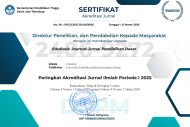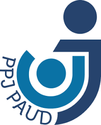Operant Conditioning Strategies in Limited Face-to-Face Learning Activities in Forming the Responsibility Character
Abstract
The change in learning from what was originally face-to-face to distance learning and then switched to limited face-to-face learning made students need to adapt to all the provisions in the learning process. It then impacts the student's responsible character. This study, therefore, aims to discuss the process of forming the student responsibility character through the operant conditioning type in limited face-to-face learning activities. The research method used was qualitative with a narrative approach model. This study’s subjects were the principal, a fifth-grade homeroom teacher, and nine fifth-grade students of State Elementary School of 1 Barongan. Besides, data collection techniques employed were interviews, observation, and documentation. The data validity was tested by triangulation of sources and data collection techniques in the study. Data analysis techniques utilized were data reduction, data presentation, and conclusions. This study’s results highlighted those changes in the learning system impacted the student responsibility character; thus, there is a need for the formation of the responsibility character. The formation of the responsibility character will be more substantial if given direct reinforcement (Operant Conditioning Theory). Operant conditioning consists of two main concepts: reinforcement and punishment. Reinforcement is divided into positive reinforcement (such as attention, approval, and appreciation) and negative reinforcement (e.g., reducing material and giving assignment pause). Meanwhile, punishments encompass reprimands, emphasis, and additional assignments.
Keywords
Full Text:
PDFReferences
Basar, A. M. (2021). Problematika pembelajaran jarak jauh pada masa pandemi covid-19 (Studi kasus di SMPIT Nurul Fajri - Cikarang Barat - Bekasi). Edunesia : Jurnal Ilmiah Pendidikan, 2(1), 208–218.
Faizin, A., & Haerussaleh, H. (2020). Narrative research: A research design. Jurnal Disastri: Pendidikan Bahasa dan Sastra Indonesia, 2(3), 142–148.
Gularso, D., & Firoini, K. A. (2017). Pendidikan karakter melalui program pembiasaan di SD Islam Terpadu Insan Utama Bantul Yogyakarta. Trihayu: Jurnal Pendidikan Ke-SD-an, 2(2), 19–25.
Handarini, O. I., & Wulandari, S. S. (2020). Pembelajaran daring sebagai upaya study from home (SFH) selama pandemi covid 19. Jurnal Pendidikan Administrasi Perkantoran (JPAP), 8(3), 465–503.
Hastjarjo, T. D. (2011). Meluruskan konsep kondisioning operan. Buletin Psikologi, 19(1), 38–43.
Hero, H., & Esthakia, M. (2021). Implementasi pemberian reward kepada siswa kelas IV SDK Waiara. Didaktik : Jurnal Ilmiah PGSD STKIP Subang, 6(2), 322–332.
Khasanah, A. N. (2015). Analisis lingkungan SMA 02 Batang terhadap proses pembelajaran kimia. Jurnal Pendidikan Sains, 3(1), 23–29.
Mustaqim, M. (2016). Paradigma perilaku sosial dengan pendekatan behavioristik (Telaah Atas teori Burrhusm Frederic Skinner). Al-Mabsut: Jurnal Studi Islam dan Sosial, 10(2), 503–513.
Primasari, I. F. N. D., & Zulela, Z. (2021). Kendala pembelajaran jarak jauh (PJJ) secara online selama masa pandemik covid-19 di sekolah dasar. JIKAP PGSD: Jurnal Ilmiah Ilmu Kependidikan, 5(1), 64–73.
Radjah, C. L., Utami, N. W., Simon, I. M., & Rachmawati, I. (2021). Bentuk-bentuk reinforcement dan punishment untuk pembentukan perilaku siswa di Kabupaten Malang. Jurnal Karinov, 4(2), 94–100.
Ristiana, D., Masturi, M., & Pratiwi, I. A. (2020). Kedisiplinan belajar siswa kelas IV SD Negeri Pogading. Journal for Lesson and Learning Studies, 3(2), 165–172.
Rochmah, E. Y. (2016). Mengembangkan karakter tanggung jawab pada pembelajar: Perspektif psikologi barat dan psikologi islam. AL-MURABBI: Jurnal Studi Kependidikan dan Keislaman, 3(1), 36–54.
Rosyida, D. A., & Saputri, Z. D. (2022). Cultivating character education for prospective elementary school teachers through elementary social studies courses. Review of Multidisciplinary Education, Culture and Pedagogy, 1(3), 87–96.
Sari, S. P., & Bermuli, J. E. (2021). Pembentukan karakter tanggung jawab siswa pada pembelajaran daring melalui implementasi pendidikan karakter. Jurnal Kependidikan, 7(3), 511–519.
Setiyowati, D. K., & Trisharsiwi, T. (2022). Peran guru dalam implementasi sikap tanggung jawab melalui Tri Nga (ngerti, ngrasa, nglakoni) siswa kelas V SDN 1 Mutihan. Trihayu: Jurnal Pendidikan Ke-SD-an, 8(3), 1468–1474.
Shidiq, M. I., & Hidayat, S. (2020). Eksplorasi perilaku menyontek di kalangan siswa sekolah dasar di Kota Tasikmalaya. EduBasic Journal: Jurnal Pendidikan Dasar, 2(1), 19–25.
Sholihah, M., & Laela, F. N. (2021). Penggunaan negative reinforcement sebagai model pola asuh dalam meningkatkan perilaku disiplin anak usia dini di TPQ Daarul Qur’an Wonosari Jurnal Bimbingan dan Konseling Islam, 11(1), 78–93.
Suwartini, S. (2017). Pendidikan karakter dan pembangunan sumber daya manusia berkelanjutan. Trihayu: Jurnal Pendidikan Ke-SD-an, 4(1), 220–234.
Syafitri, R. (2017). Meningkatkan tanggung jawab belajar melalui strategi giving questions and getting answers pada siswa. Jurnal Penelitian dan Pengembangan Pendidikan, 1(2), 57–63.
Wibowo, I. S., & Maqfirotun, S. (2016). Peran guru dalam membentuk tanggung jawab siswa kelas V sekolah dasar. Jurnal Gentala Pendidikan Dasar, 1(1), 61–72.
Yulailawati, E., Nurhaidah, N., & Safiah, I. (2017). Pemberian punishment yang dilaksanakan guru di SD Negeri 4 Banda Aceh. Jurnal Ilmiah Pendidikan Guru Sekolah Dasar FKIP Unsyiah, 2(1), 12–21.
Yulianti, S., Putra, J. A., & Antosa, Z. (2019). Pengaruh reinforcement negatif terhadap motivasi belajar IPA siswa SD. JOM FKIP Universitas Riau, 6(1), 1–10.
Zaini, R. (2014). Studi atas pemikiran B. F. Skinner tentang belajar. Terampil: Jurnal Pendidikan dan Pembelajaran Dasar, 1(1), 118–129.
DOI: https://doi.org/10.17509/ebj.v4i2.48924
Refbacks
- There are currently no refbacks.
Copyright (c) 2022 Universitas Pendidikan Indonesia
This work is licensed under a Creative Commons Attribution 4.0 International License.
This journal is indexed by




.png)




.png)
1.png)


1.png)

.png)